On November 23, 2022, the Special Roundtable Dialogue of Green Lancang-Mekong Initiative: Towards COP15--Senior-level Roundtable Dialogue on Integrated Ecosystem Management (IEM) in the Lancang-Mekong Region (the Dialogue) was successfully held as part of the 5th anniversary series of the Lancang-Mekong Environmental Cooperation Center (LMEC) in online and offline form in Beijing. The Dialogue was guided by the Ministry of Ecology and Environment of China (MEE), co-organized by LMEC / Foreign Environmental Cooperation Center of MEE (FECO) and the United Nations Environment Programme (UNEP) Regional Office for Asia and the Pacific, and supported by the UNEP International Ecosystem Management Partnership (UNEP-IEMP). Representatives from MEE and local departments of ecology and environment, departments of natural resources and environment of Mekong countries, UN agencies, international organizations, research institutes, and enterprises participated in this conference. Zhang Yujun, Director-General of FECO, Sun Xuefeng, Deputy Director-General of the Department of International Cooperation of MEE, and Dechen Tsering, Director of UNEP Regional Office for Asia and the Pacific attended the Dialogue and delivered speeches. Wang Qian, the programme management officer of UNEP China Office, presided at the opening ceremony.
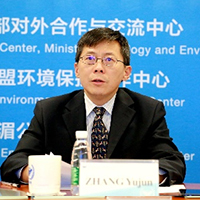
Dr. Zhang Yujun stated that LMEC is an important player in Lancang-Mekong Cooperation which is a pioneering area for the Global Development Initiative (GDI) and aims for creating a "golden model" for regional cooperation. Since its establishment in 2017, LMEC has made significant achievements in promoting regional cooperation in the fields of ecology, environment and climate change. In the future, LMEC will continue to coordinate with the Mekong countries to develop a new
Lancang-Mekong Environmental Cooperation Strategy and Action Framework, and work together to build a Lancang-Mekong pioneering area for the GDI, provide Mekong solutions for building a clean, beautiful and prosperous Asia-Pacific, and help the region achieve the UN Sustainable Development Goals.
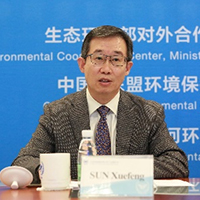
Dr. Sun Xuefeng emphasized that the Chinese government has always taken the lead in building ecological civilization and insisted on prioritizing ecological protection, conserving resources while using them efficiently, and pursuing green and low-carbon development. Over the past decade, the Chinese government has placed ecological protection in an important position in the construction of ecological civilization, and has achieved remarkable results in the fields of biodiversity conservation and ecosystem management. In the future, China will work collaboratively with the Lancang-Mekong countries to further deepen good neighborliness and practical cooperation, share ideas and experiences in the areas of regional ecosystem management, biodiversity conservation, addressing climate change and enhancing sustainable livelihoods, and jointly promote implementing the 2030 Agenda for Sustainable Development in the region.
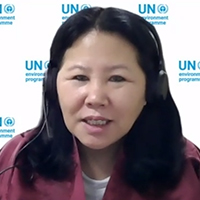
Dr. Dechen Tsering pointed out that IEM is a promising solution for reversing the current trend of threatening sustainable ecosystems, as it helps balance the competing human needs with the long-term sustainability of ecosystems. It will be an important mechanism for addressing biodiversity loss, climate change, and environmental pollution in the future, according to Dechen Tsering. UNEP is committed to supporting the expansion of the application of IEM approaches in the Lancang-Mekong region, promoting regional and cross-sectoral cooperation to maximize synergies and promote harmonious coexistence between people and nature and the achievement of sustainable development goals.
The Dialogue focused on three topics: IEM case sharing in the Lancang-Mekong Region, policy dialogue on ecosystem management in the Region, and regional program on ecosystem management in the Region. The Dialogue shared the implementation status and experience of IEM projects under the Mekong-Lancang framework supported by the UNEP-China Trust Fund, communicated the policies, practices and future plans related to ecosystem management and sustainable livelihoods in the Lancang-Mekong countries, and discussed the topics of promoting regional IEM such as ecosystem assessment, biodiversity economy and agricultural products management, sustainable forest use and finance, profitable nature-based solutions, and sustainable development changes and practice exploration of natural rubber.
The participants unanimously expressed that the synergy of IEM and sustainable livelihoods has a positive contribution to achieving sustainable development goals, such as biodiversity conservation, addressing climate change, poverty reduction, and promoting gender equality in the Region.
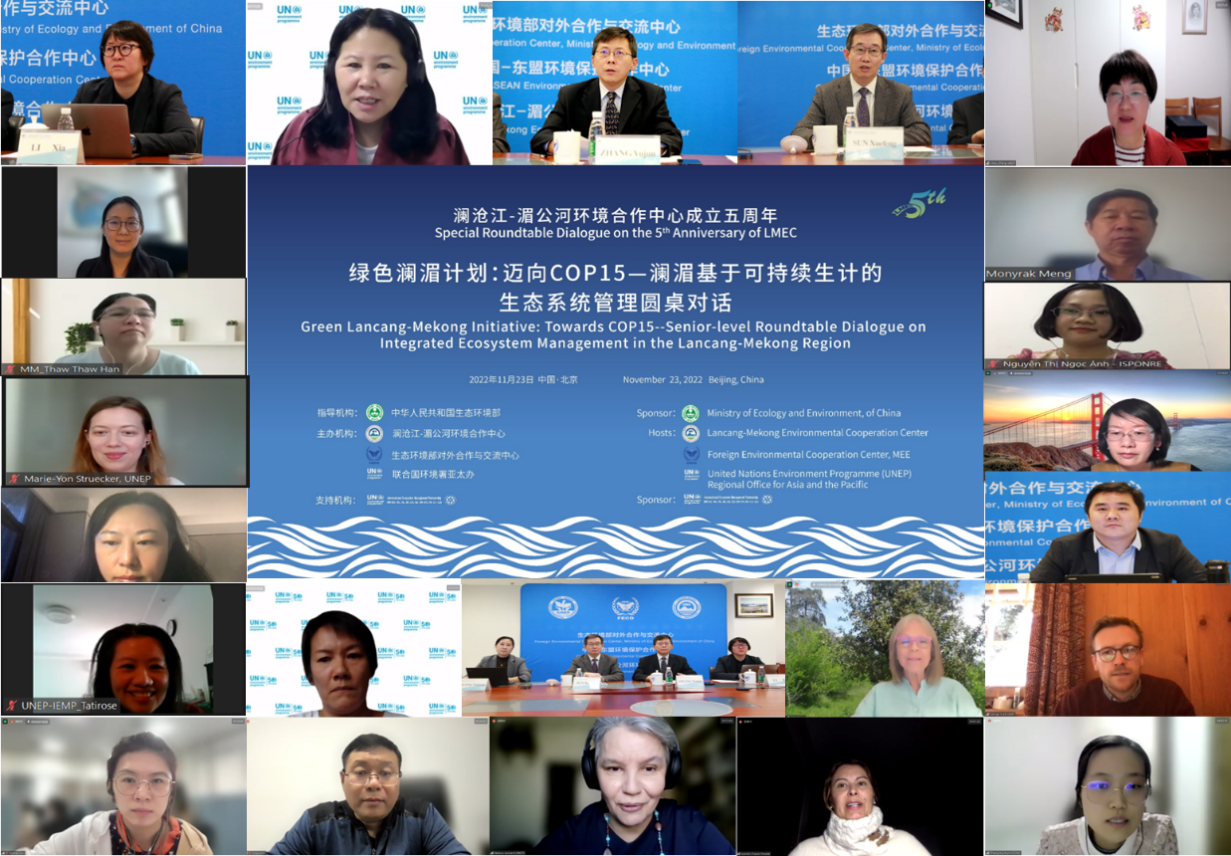

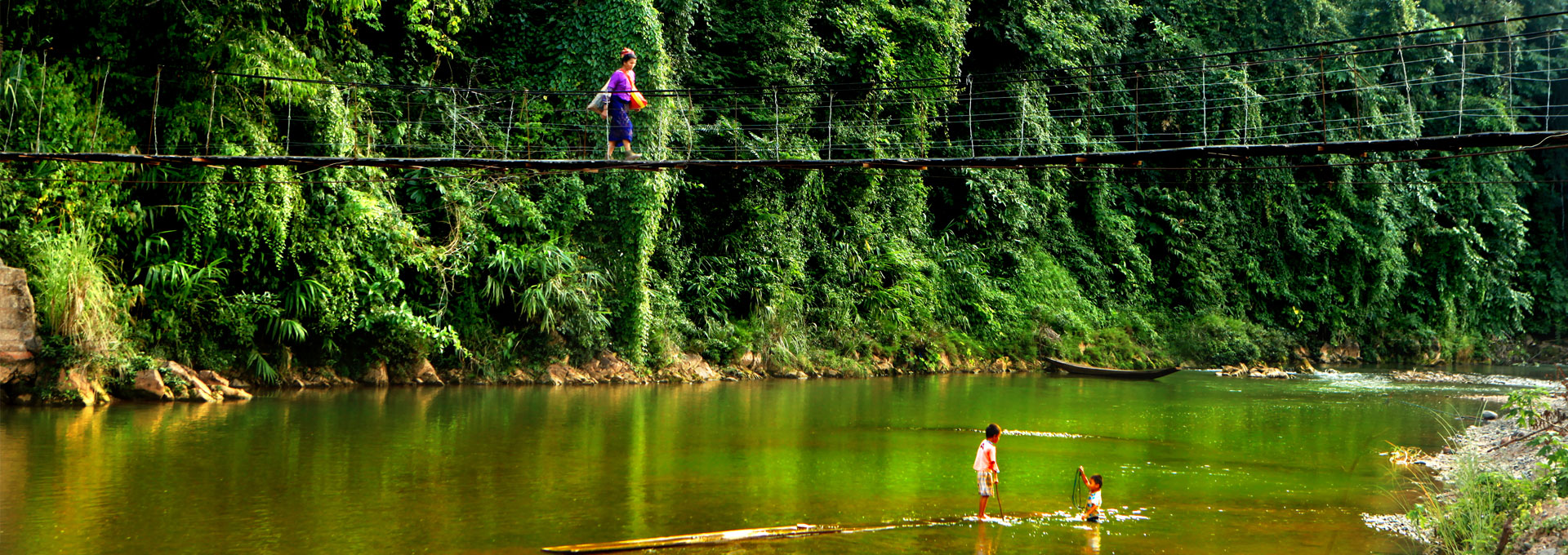

 Dr. Zhang Yujun stated that LMEC is an important player in Lancang-Mekong Cooperation which is a pioneering area for the Global Development Initiative (GDI) and aims for creating a "golden model" for regional cooperation. Since its establishment in 2017, LMEC has made significant achievements in promoting regional cooperation in the fields of ecology, environment and climate change. In the future, LMEC will continue to coordinate with the Mekong countries to develop a new Lancang-Mekong Environmental Cooperation Strategy and Action Framework, and work together to build a Lancang-Mekong pioneering area for the GDI, provide Mekong solutions for building a clean, beautiful and prosperous Asia-Pacific, and help the region achieve the UN Sustainable Development Goals.
Dr. Zhang Yujun stated that LMEC is an important player in Lancang-Mekong Cooperation which is a pioneering area for the Global Development Initiative (GDI) and aims for creating a "golden model" for regional cooperation. Since its establishment in 2017, LMEC has made significant achievements in promoting regional cooperation in the fields of ecology, environment and climate change. In the future, LMEC will continue to coordinate with the Mekong countries to develop a new Lancang-Mekong Environmental Cooperation Strategy and Action Framework, and work together to build a Lancang-Mekong pioneering area for the GDI, provide Mekong solutions for building a clean, beautiful and prosperous Asia-Pacific, and help the region achieve the UN Sustainable Development Goals. Dr. Sun Xuefeng emphasized that the Chinese government has always taken the lead in building ecological civilization and insisted on prioritizing ecological protection, conserving resources while using them efficiently, and pursuing green and low-carbon development. Over the past decade, the Chinese government has placed ecological protection in an important position in the construction of ecological civilization, and has achieved remarkable results in the fields of biodiversity conservation and ecosystem management. In the future, China will work collaboratively with the Lancang-Mekong countries to further deepen good neighborliness and practical cooperation, share ideas and experiences in the areas of regional ecosystem management, biodiversity conservation, addressing climate change and enhancing sustainable livelihoods, and jointly promote implementing the 2030 Agenda for Sustainable Development in the region.
Dr. Sun Xuefeng emphasized that the Chinese government has always taken the lead in building ecological civilization and insisted on prioritizing ecological protection, conserving resources while using them efficiently, and pursuing green and low-carbon development. Over the past decade, the Chinese government has placed ecological protection in an important position in the construction of ecological civilization, and has achieved remarkable results in the fields of biodiversity conservation and ecosystem management. In the future, China will work collaboratively with the Lancang-Mekong countries to further deepen good neighborliness and practical cooperation, share ideas and experiences in the areas of regional ecosystem management, biodiversity conservation, addressing climate change and enhancing sustainable livelihoods, and jointly promote implementing the 2030 Agenda for Sustainable Development in the region. Dr. Dechen Tsering pointed out that IEM is a promising solution for reversing the current trend of threatening sustainable ecosystems, as it helps balance the competing human needs with the long-term sustainability of ecosystems. It will be an important mechanism for addressing biodiversity loss, climate change, and environmental pollution in the future, according to Dechen Tsering. UNEP is committed to supporting the expansion of the application of IEM approaches in the Lancang-Mekong region, promoting regional and cross-sectoral cooperation to maximize synergies and promote harmonious coexistence between people and nature and the achievement of sustainable development goals.
Dr. Dechen Tsering pointed out that IEM is a promising solution for reversing the current trend of threatening sustainable ecosystems, as it helps balance the competing human needs with the long-term sustainability of ecosystems. It will be an important mechanism for addressing biodiversity loss, climate change, and environmental pollution in the future, according to Dechen Tsering. UNEP is committed to supporting the expansion of the application of IEM approaches in the Lancang-Mekong region, promoting regional and cross-sectoral cooperation to maximize synergies and promote harmonious coexistence between people and nature and the achievement of sustainable development goals.
